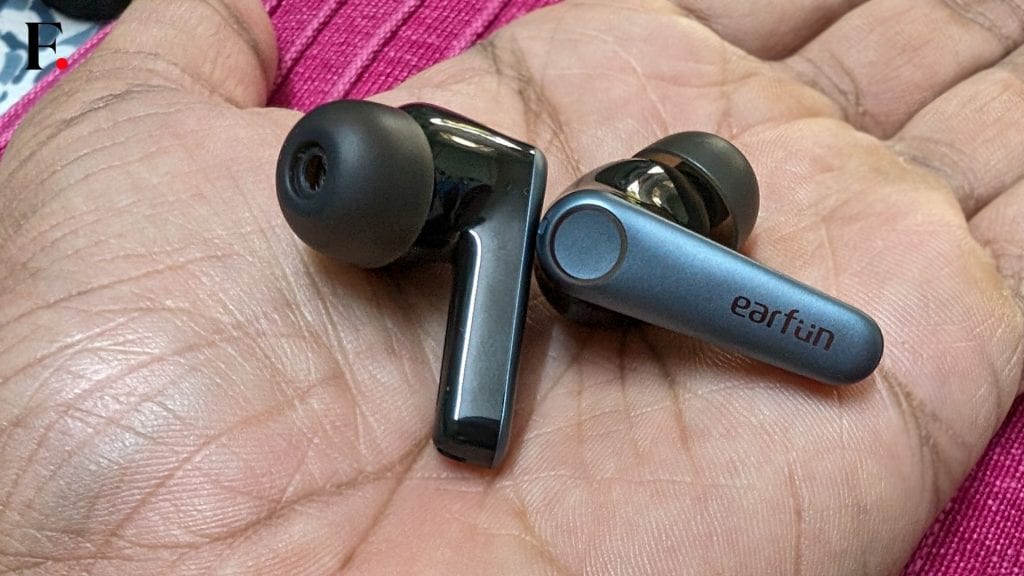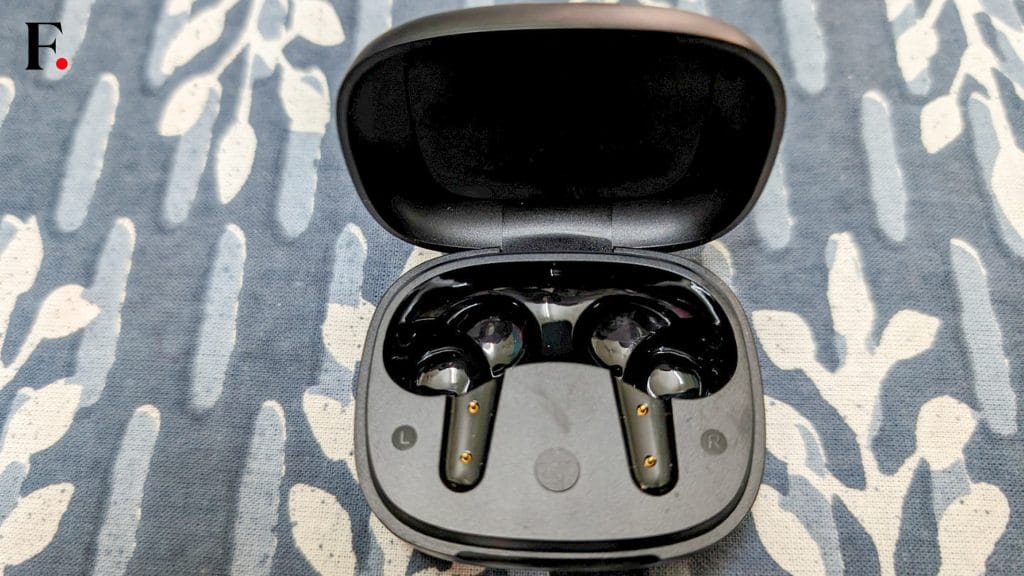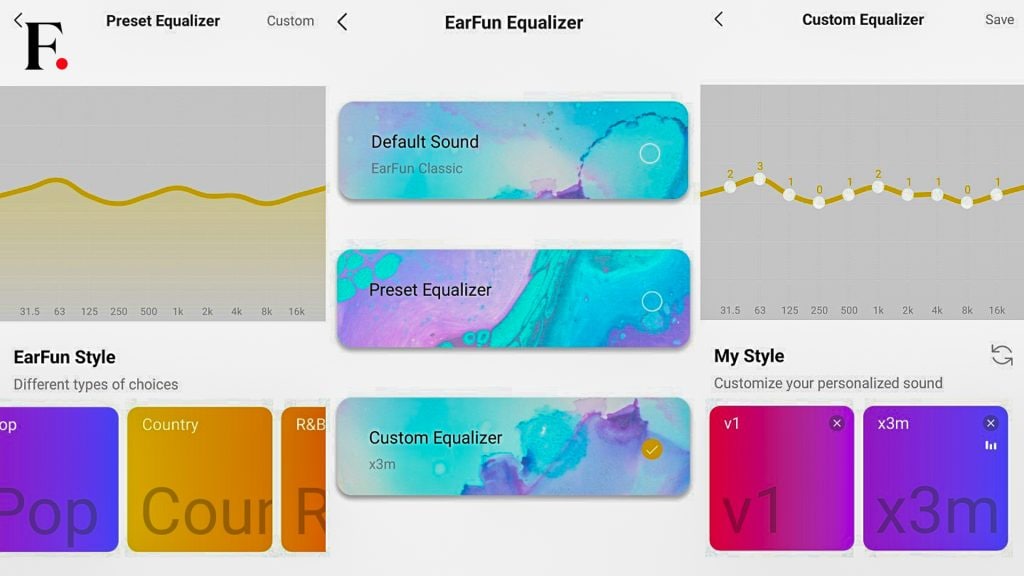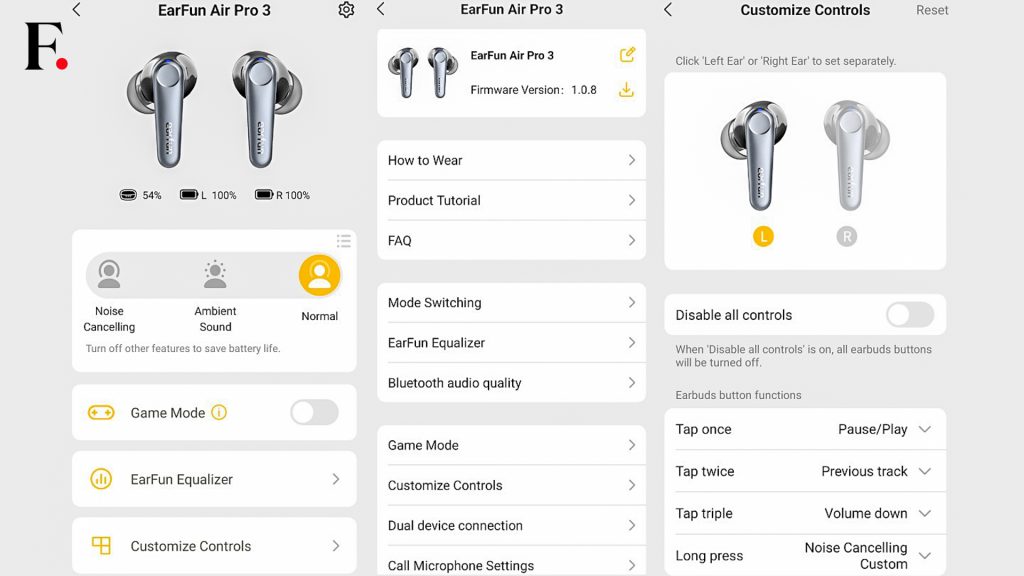Pros:
– Fun and energetic sound output
– Usable sound presets, handy sound tweaks
– Support for aptX Adaptive codec
– Comfortable in-ear fit, good passive noise isolation
– Dual pairing support, IPX5-rated splash resistance
– Impressive battery backup, supports wireless charging
– Configurable controls, volume control on the buds
– 18-months warranty
Cons:
– Active noise cancellation needs improvement
– No wear detection sensors
– Touch sensitivity can be iffy at times
Rating: 4/5
Price: Rs 5,625
I had heard some good things about audio products from EarFun but never got an opportunity to try one till the company reached out to us for the review of their recent Air Pro 3 true wireless (TWS) earbuds. Operating in the $60 to $80 range in North America is very different from entering a similar budget band in India. In the case of the former, the competition is fairly scarce, while the segment is packed with capable players from the likes of OnePlus, Realme, Oppo and more.
The EarFun Air Pro 3 does offer something that’s quite rare in this segment – support for Qualcomm’s highly efficient aptX Adaptive codec. But as we have seen in the past, simply having a good codec doesn’t guarantee a great aural experience. So does this new entrant have enough tricks up its sleeve to carve a niche for itself, or will the gatekeepers deny it entry? Let’s find out.
EarFun Air Pro 3: Design and Comfort (8/10)
The EarFun Air Pro 3 reminded me of certain Soundcore (Anker) earbuds in more ways than one, starting with the design language. The black body, metallic grey stems and subtle branding on them are reminiscent of the Soundcore Liberty Air 2 Pro buds. The combination works well and looks elegant. The touch zones have a slight indentation with a circular ring to mark the area. The buds are a bit on the larger side but do not stick out of the ears much after you put them on.
The earbuds offer a snug fit and are comfortable to wear for long hours. The right-sized silicone tips from the four bundled pairs provide very good passive noise isolation. It’s always a good idea to spend a few minutes choosing the right tips for optimal sound quality and better active noise cancellation (ANC). The weight of the earbuds, though not specified, is on the lighter side despite each of them hosting a 54 mAh battery. The buds and case combined weigh 52 grams.

Speaking of the case, it is compact in terms of width but not slim enough to be termed pocketable, unless you are fine with a noticeable bulge in the pocket. The build quality is fine but the all matte black design looks a touch bland. The case packs a 520 mAh battery, and you get 3 tiny white LEDs at the front to give you an idea about the level of remaining charge. A USB-C charging port is located at the back and a Bluetooth pairing/reset button is placed inside the case.
EarFun Air Pro 3: Features and Specifications (8.5/10)
As I mentioned earlier, these EarFun buds support Qualcomm’s aptX Adaptive codec that offers a great mix of throughput and power efficiency; something rare in India under Rs 7,500. These Bluetooth 5.3-compliant earphones also support AAC and SBC codecs. Each earbud is fitted with an 11 mm wool composite driver and three microphones for calling and ANC. Strangely, the company has skipped wear detection sensors; probably an oversight.
The buds have an IPX5 rating for splash resistance. So you can wear them to the gym or for a jog in a light drizzle without a worry. The case doesn’t have any ingress protection though, so keep it away from moisture. The touch zones at the back of the buds are sizable but the touch sensitivity can be iffy sometimes. At times it can be too sensitive and registers an extra tap, and on occasion misses one entirely. It isn’t erratic all the time but can be irritating when it skips a track when you are just trying to pause it.

You can assign different tasks to gestures through the EarFun Audio app available on iOS and Android both. You can assign play/pause, previous/next tracks, ANC toggle, voice assistant and volume control to single-tap, double-tap, triple-tap or touch-and-hold gestures. Speaking of ANC, you get three modes to switch between — ANC on, ANC off and Transparency mode that lets ambient noise through. The amount of noise reduction hasn’t been quantified by the brand.
The latency on the EarFun Air Pro 3 is fairly low when watching videos, and there was no perceptible lag between audio and video. In Game Mode, it can go as low as 55 ms as per the spec sheet. These earbuds support dual pairing and one can pair them with two devices simultaneously. Both the paired devices can use aptX Adaptive codecs if they are compliant with it.
EarFun Air Pro 3: Performance (7.5/10)
The wireless range is good with a strong connection at 10 metres with no obstruction between the source and the listener. The company claims that these buds can even operate at a 15 metres distance, but I did not go that far. These EarFun buds need to be pushed to 70-75 per cent volume when outdoors for normal loudness. The sound doesn’t crack even if you go closer to 90 per cent, though you may not need to go that high. There are no latency issues as I mentioned earlier.
Before we head to the sound quality, let’s talk about the different audio presets and customisations available through the EarFun Audio app. The app is easy to use with a clean layout and simple UI, again reminding me of its Soundcore counterpart. You get a handful of options to play around with, but I would like to draw your attention particularly to the sound tweaks. Other than the default/signature sound profile, you get ten audio presets, half of which are actually usable, Country and R&B being our top picks.

Then you also have a 10-band equaliser (EQ) to create your own sound profiles. But what I liked best is the company shares the EQ config of the presets. So if you only need to make minor adjustments to that particular preset, you can do so from the equaliser, rather than starting from scratch to recreate a similar profile, as is the case with most audio products. This is a leaf other manufacturers should surely take out of EarFun’s book.
Moving on to the sound quality, the default sound clearly favours the low-end frequencies. In simpler terms, it’s a touch bass-heavy. Though the bass isn’t as boomy as you get on certain OnePlus buds on their Balanced profile, the bass needs to be reigned in a bit to let the midrange express itself a bit more. That is where the Country or R&B sound presets help, along with the 10-band equaliser. Best results can be obtained by reducing the upper bass a bit and boosting the mids around the 1 KHz mark.
As I touched upon earlier, the simpler way of getting there is by choosing the aforementioned presets and making finer adjustments in the EQ to suit your taste. Post that you get a more balanced sound with ample warmth and a lot of energy. Though the lows still retain prominence, the bass is tighter and punchy, the vocals sound a lot cleaner and the highs have just the right amount of sparkle to make these earphones enjoyable across various genres of music and other content.

The soundstage is decently broad and the imaging is acceptable. However, I would have preferred to hear a bit more detail in sound given its price tag. All said and done, the sound quality of these earbuds is pretty good for a pair of midrange TWS earphones. Those who like extra bass may enjoy the default sound itself, or find one of the presets to their liking. Thus the EarFun Air Pro 3 caters to a broader taste courtesy of the sound tweaks that the companion app provides.
While the sound is fine, the ANC here can do with a bit of improvement. The noise cancellation does work but not as good as some of its competitors that sell for a few hundred Rupees less. Realme has taken the ANC game to a different level even in affordable TWS earphones and the Air Pro 3 has a lot of catching up to do. It does reduce a handful of low-frequency sounds like the whirr of a fan indoors or the sound of car engines when outdoors, but cannot eliminate them entirely.

It isn’t as effective against human voices either, but turning on ANC is still helpful in office spaces and public transport rather than keeping it off. The Transparency mode certainly needs more work. It tends to amplify all the sounds, resulting in a constant buzz-like wind noise when enabled and dampens the voices being let through. It is still useful in being aware of your surroundings but not so good at having conversations with the buds in your ears.
EarFun Air Pro 3: Call quality (7/10)
The call quality on these earbuds is good when in quieter areas. People on the line were perfectly audible to each other with good voice clarity. When outdoors, wind noise suppression works well, but a lot of ambient noises are let through. They aren’t overly distracting in most cases, but when in noisy areas, the conversation does get impacted.
EarFun Air Pro 3: Battery life (8.5/10)
This is one department where this EarFun product thrives. The company promises 7 hours of playback for the buds with ANC on and 9 hours with ANC off. The case promises to charge them four more times, thus taking the overall battery backup figures between 35 to 45 hours under test conditions, which is mighty impressive on paper. While we did not get those figures in our tests, the results were still impressive.
With aptX Adaptive codec, ANC is turned on at all times and loudness is around 70 per cent, the buds lasted just a little over 5 and a half hours, which is quite good. Without ANC, the number was closer to 7 and a half hours, which isn’t bad either. With the charging case, you get battery figures in the range of 27 to 37 hours depending on the ANC usage. These are robust figures and among the best in the segment.

The fast charging is modest with a 10-minute charge giving you close to two hours of playtime with ANC off. The buds take about an hour to charge fully from zero, while the case takes two when using a wired charger. The EarFun Air Pro 3 also supports wireless charging with Qi-certified chargers; the charging time is almost double that. The battery level of each earbud and the charging case can be seen in the companion app.
EarFun Air Pro 3: Price and Verdict
The EarFun Air Pro 3 is officially priced at Rs 7,499 in India and is perpetually available for a discounted price ranging between Rs 5,499 to Rs 6,399 for different colour variants on Amazon India. It offers an 18-month warranty, which is 6 months more than what competing products do. That should alleviate concerns about a lesser-known brand here. So is it worth the asking price? The answer is a definite yes, but if you can grab it closer to Rs 5.5K.

The EarFun Air Pro 3 is a good, feature-rich product with fun and energetic sound that offers a lot of customisation through the companion app and provides solid battery backup. The ANC is average at best and it misses wear detection sensors, but it still offers plenty and is probably the only one to support aptX Adaptive codec in this price bracket. In most countries that would make it a straightforward choice, but in India, it has three prime competitors to contend with.
The Realme Buds Air 5 Pro, Oppo Enco Air3 Pro and the OnePlus Buds Z2, all priced at Rs 4,999, offer more or less the same features, sans aptX codec. The sound quality is comparable too, all have wear-detection sensors, and while the ANC is better on the Realme and Oppo buds, the OnePlus flaunts the best transparency mode. The Realme Buds Air 5 Pro sounds a bit more detailed, courtesy of its dual drivers. However, this EarFun product trumps all three in terms of battery backup. So pick one that appeals to you more; neither will disappoint you.
Leave A Comment
You must be logged in to post a comment.